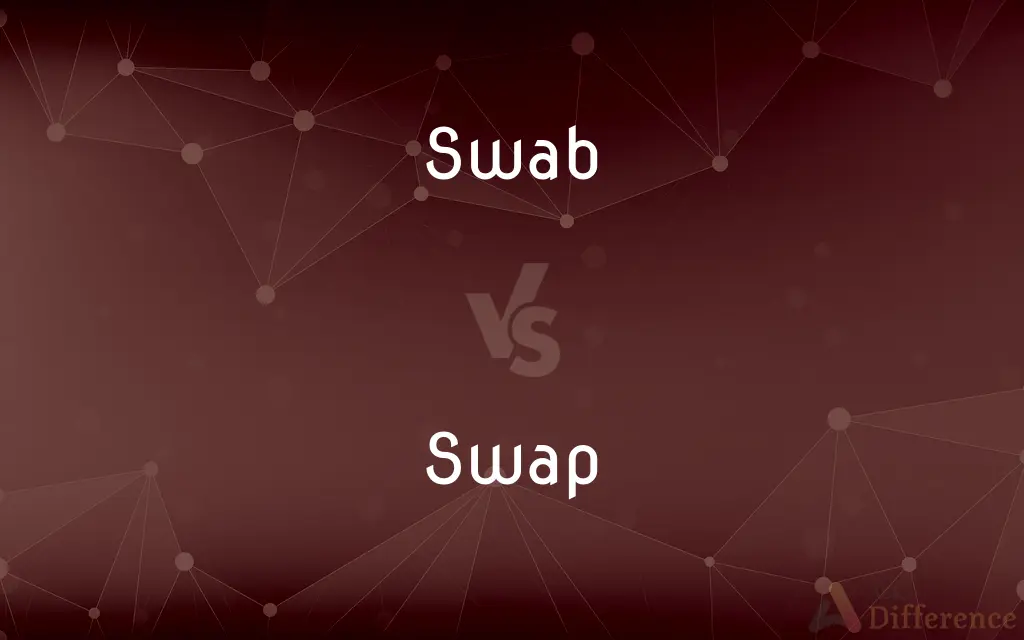Swab vs. Swap — What's the Difference?
By Tayyaba Rehman & Urooj Arif — Updated on May 12, 2024
A swab is a small piece of absorbent material used for cleaning or collecting samples, whereas swap refers to exchanging one item for another.

Difference Between Swab and Swap
Table of Contents
ADVERTISEMENT
Key Differences
Swabs are tools typically used in medical settings, cleaning tasks, or forensic applications. They consist of a small piece of absorbent material, such as cotton, attached to the end of a stick. Swabs are designed to access small or difficult-to-reach areas, making them ideal for collecting samples or applying substances. In contrast, a swap is an action or process where two parties exchange items or services of similar value.
While swabs are used to ensure cleanliness or gather important samples for analysis, swaps involve trading or exchanging items to mutually benefit the participating parties. For example, using a swab to clean an electronic device's intricate parts is crucial for maintenance, whereas swapping old books at a community exchange offers a way to renew personal libraries without purchasing new titles.
Swabs play a critical role in healthcare, particularly in procedures like testing for infections or applying medications. On the other hand, swaps are commonly seen in finance, where they can involve exchanging debts, currencies, or other financial instruments to leverage different economic conditions.
The effectiveness of a swab depends on its material and the precision with which it is used. Conversely, the success of a swap depends on the agreement's terms and the perceived value of the exchanged items. This difference highlights how swabs are practical tools for specific tasks, while swaps are strategic transactions aimed at achieving a balanced or beneficial exchange.
Despite their different contexts, both swabs and swaps are essential in their respective fields. Swabs ensure accurate and hygienic sample collection crucial for diagnoses and treatments, while swaps facilitate flexibility and potential profit in financial markets or personal exchanges.
ADVERTISEMENT
Comparison Chart
Definition
A small piece of absorbent material on a stick used for cleaning or sample collection.
An exchange of items or services between two parties.
Primary Use
Medical sampling, cleaning, application of substances.
Trading items, financial instruments, or services.
Context
Medical, forensic, personal care.
Financial, personal exchange, bartering.
Dependency
Effectiveness depends on material and application precision.
Success depends on the terms of agreement and perceived value.
Outcome
Clean or sample area for further analysis or treatment.
Mutual benefit or gain from exchanged items or services.
Compare with Definitions
Swab
A small tool made with absorbent material used for cleaning or collecting samples.
The doctor used a swab to collect throat cultures for the strep test.
Swap
The act of exchanging one item or service for another.
He swapped his old car for a newer model through an online marketplace.
Swab
Commonly used in medical settings for hygiene and precise applications.
Nurses use swabs to apply medication to patients' wounds.
Swap
Can involve bartering goods in a personal or community setting.
At the community swap meet, participants exchange items like books and toys without monetary transactions.
Swab
Often used in household cleaning, especially for hard-to-reach areas.
Cleaning the inside of a computer keyboard requires a small, precise swab.
Swap
Used in casual contexts to trade items of similar interest or value.
Kids swap trading cards to complete their collections.
Swab
Critical in forensic science for collecting potential evidence.
Forensic teams collect DNA evidence at crime scenes using sterile swabs.
Swap
Take part in an exchange of
We swapped phone numbers
I'd swap places with you any day
I was wondering if you'd like to swap with me
Swab
A small piece of absorbent material attached to the end of a stick or wire and used for cleansing a surface, applying medicine, or collecting a sample of a substance.
Swap
An act of exchanging one thing for another
Let's do a swap
Swab
A sample collected with a swab.
Swap
To trade one thing for another.
Swab
A sponge or patch of absorbent material used to clean the bore of a firearm or cannon.
Swap
To exchange (one thing) for another.
Swab
A mop used for cleaning floors or decks.
Swap
An exchange of one thing for another.
Swab
(Slang) A sailor.
Swap
A contract in which two parties agree to exchange periodic interest payments, especially when one payment is at a fixed rate and the other varies according to the performance of a reference rate, such as the prime rate.
Swab
(Slang) A lout.
Swap
(transitive) To exchange or give (something) in an exchange (for something else).
Swab
To use a swab on.
Swap
To hit, to strike.
Swab
To clean with a swab.
Swap
To beat the air, or ply the wings, with a sweeping motion or noise; to flap.
Swab
To collect a sample from (a person, for example) using a swab.
Swap
To descend or fall; to rush hastily or violently.
Swab
(medicine) A small piece of soft, absorbent material, such as gauze, used to clean wounds, apply medicine, or take samples of body fluids. Often attached to a stick or wire to aid access.
Swap
An exchange of two comparable things.
Swab
A sample taken with a swab piece of absorbent material.
Swap
(finance) A financial derivative in which two parties agree to exchange one stream of cashflow against another stream.
Swab
A piece of material used for cleaning or sampling other items like musical instruments or guns.
Swap
Space available in a swap file for use as auxiliary memory.
How much swap do you need?
Swab
A mop, especially on a ship.
Swap
(Cantab slang) A social meal at a restaurant between two university societies, usually involving drinking and banter; commonly associated with fining and pennying; equivalent to a crewdate at Oxford University.
Swab
(slang) A sailor; a swabby.
Swap
A blow; a stroke.
Swab
(slang) A naval officer's epaulet.
Swap
To strike; - with off.
Swab
(transitive) To use a swab on something, or clean something with a swab.
Swab the deck of a ship
Swap
To exchange (usually two things of the same kind); to swop.
Swab
To clean with a mop or swab; to wipe when very wet, as after washing; as, to swab the desk of a ship.
Swap
To fall or descend; to rush hastily or violently.
All suddenly she swapt adown to ground.
Swab
A kind of mop for cleaning floors, the desks of vessels, etc., esp. one made of rope-yarns or threads.
Swap
To beat the air, or ply the wings, with a sweeping motion or noise; to flap.
Swab
A bit of sponge, cloth, or the like, fastened to a handle, for cleansing the mouth of a sick person, applying medicaments to deep-seated parts, etc.
Swap
A blow; a stroke.
Swab
An epaulet.
Swap
An exchange; a barter.
Swab
A cod, or pod, as of beans or pease.
Swap
Hastily.
Swab
A sponge, or other suitable substance, attached to a long rod or handle, for cleaning the bore of a firearm.
Swap
An equal exchange;
We had no money so we had to live by barter
Swab
Implement consisting of a small piece of cotton that is used to apply medication or cleanse a wound or obtain a specimen of a secretion
Swap
Exchange or give (something) in exchange for
Swab
Cleaning implement consisting of absorbent material fastened to a handle; for cleaning floors
Swap
Move (a piece of a program) into memory, in computer science
Swab
Wash with a swab or a mop;
Swab the ship's decks
Swap
Frequently used in financial markets to exchange derivatives, currencies, or commodities.
Companies often engage in currency swaps to hedge against foreign exchange risk.
Swab
Apply (usually a liquid) to a surface;
Dab the wall with paint
Swap
Integral to strategic financial planning and investment.
Financial advisors recommend certain swaps to optimize tax liabilities or returns.
Swab
Available in various sizes and materials based on their specific uses.
Cotton swabs are popular for personal care, like cleaning ear canals.
Common Curiosities
How do financial swaps work?
Financial swaps involve two parties agreeing to exchange cash flows or other financial assets over time according to predetermined rules.
Can a swap be done with services instead of goods?
Yes, services can be swapped just like physical goods, often seen in skill exchanges or professional services trades.
Are there environmental benefits to swapping items?
Yes, swapping items can reduce waste and consumption by reusing goods, thus benefiting the environment.
Can swaps be legally binding?
Yes, swaps, especially in financial contexts, can be legally binding agreements that require adherence to specific terms and conditions.
How do swaps differ from sales?
Swaps involve trading items without the exchange of money, whereas sales typically involve buying goods or services with money.
What are the benefits of using swabs for sample collection?
Swabs can access and collect samples from areas that are otherwise difficult to reach, ensuring accurate results for tests or analyses.
What materials are swabs typically made from?
Swabs are often made from cotton, polyester, or foam, depending on their intended use.
What are some common uses for swabs in healthcare?
In healthcare, swabs are used for collecting biological samples, applying medicines, or cleaning wounds.
What is the most important consideration when conducting a swap?
The most important consideration is the perceived value and fairness of the exchange to ensure both parties benefit equally.
Are all swabs sterile?
Swabs used for medical or forensic purposes are sterile to prevent contamination, whereas those for household use may not be.
Share Your Discovery

Previous Comparison
Geomorphology vs. Geology
Next Comparison
Dagger vs. KnifeAuthor Spotlight
Written by
Tayyaba RehmanTayyaba Rehman is a distinguished writer, currently serving as a primary contributor to askdifference.com. As a researcher in semantics and etymology, Tayyaba's passion for the complexity of languages and their distinctions has found a perfect home on the platform. Tayyaba delves into the intricacies of language, distinguishing between commonly confused words and phrases, thereby providing clarity for readers worldwide.
Co-written by
Urooj ArifUrooj is a skilled content writer at Ask Difference, known for her exceptional ability to simplify complex topics into engaging and informative content. With a passion for research and a flair for clear, concise writing, she consistently delivers articles that resonate with our diverse audience.
















































